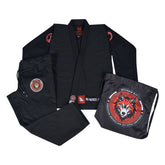Are Rash Guards Necessary for BJJ? A Complete Guide
Brazilian Jiu-Jitsu (BJJ) is a dynamic martial art. It involves close contact, grappling, and submissions. In such a physically demanding sport, the right gear plays a critical role in performance and safety. One of the key pieces of gear often discussed is the BJJ rash guard. But are rash guards really necessary for BJJ? In this article, we’ll dive deep into the purpose, benefits, and importance of rash guards in BJJ training. And whether they are essential for both Gi and No-Gi practitioners.
Shop Bjj Rash Guards
What is a BJJ Rash Guard?
A BJJ rash guard is a form-fitting, compression shirt. It is designed to protect the skin during grappling sessions. Typically made from a blend of polyester, spandex, or lycra, rash guards are lightweight, breathable, and durable. They are used in both Gi and No-Gi BJJ. They help to reduce skin irritation, prevent infections, and enhance comfort during training.
Are Rash Guards Necessary for BJJ?
Rash guards are not strictly mandatory in Gi training. But they are a requirement in No-Gi BJJ competitions, particularly in organizations like the IBJJF. Even if you're training in a Gi, rash guards offer numerous advantages that make them highly recommended for all BJJ practitioners.
Benefits of Rash Guards in BJJ
-
Protection Against Skin Irritation and Infections
One of the primary reasons BJJ athletes wear rash guards is to protect their skin from abrasions and friction burns, also known as mat burns. The close contact and constant movement during grappling can lead to skin irritation. Wearing a rash guard provides a smooth barrier between your skin and the mat or Gi. Thus preventing these skin issues.
Additionally, BJJ is a full-contact sport, and gyms can become a breeding ground for bacteria. This may happen especially if the mats are not cleaned properly. Rash guards offer an extra layer of protection against common skin infections such as ringworm and staph. Hence. keeping you safe and healthy.
-
Compression and Muscle Support
A rash guard offers compression, which helps improve blood circulation. Thus reducing muscle fatigue and soreness. The compression also supports your muscles and joints, reducing the risk of injuries. Many practitioners find that the tight fit helps them perform better, as it provides better body awareness and control.
-
Temperature Regulation and Sweat Control
BJJ training is intense, and you’re bound to sweat a lot. A BJJ rash guard is designed to wick away moisture. Therefore, it keeps you cool and comfortable throughout your training. The lightweight, breathable fabric helps regulate your body temperature by pulling sweat away from your skin. Thus allowing it to evaporate more quickly. This prevents the buildup of sweat, which can lead to discomfort and an increased risk of slipping during training.
-
Durability and Longevity of Your Gi
For those training in Gi BJJ, wearing a rash guard underneath your Gi can extend the life of your Gi. The rash guard absorbs sweat and prevents direct contact between your skin and the Gi. This reduces the wear and tear. This keeps your Gi in better condition for longer and minimizes the need for frequent replacements.
-
Enhanced Hygiene and Cleanliness
One overlooked benefit of rash guards is the added level of hygiene they provide. With the skin covered, there’s less direct contact with other people’s sweat. This reduces the risk of transferring bacteria between training partners. Additionally, wearing a rash guard means less sweat is absorbed by your Gi, making it easier to keep your gear clean.
Rash Guards in No-Gi BJJ
For No-Gi BJJ, rash guards are absolutely essential. In No-Gi training, where you don’t wear the traditional Gi, a rash guard and grappling shorts are your primary uniform. The tight-fitting nature of the rash guard prevents opponents from grabbing your clothing, which could provide an unfair advantage. In official No-Gi competitions, rash guards are required to ensure fairness and safety.
Do You Need a Rash Guard for Gi BJJ?
Although not required for Gi BJJ, wearing a rash guard underneath your Gi has many benefits. It can help protect your skin from irritation caused by the rough fabric of the Gi. It can keep you cooler by wicking away sweat, and even reduce the buildup of odor in your Gi. Some practitioners choose to train without a rash guard. But most of them find that it significantly enhances their comfort and performance during sessions.
Shop premium Bjj No Gi gear at Novakik BJJ, featuring top-quality BJJ rash guards and shorts designed for performance and durability.
Types of BJJ Rash Guards
When selecting a BJJ rash guard, it’s essential to choose one that fits well. It offers durability, and provides comfort during intense training sessions. Here are the common types of rash guards used in BJJ:
- Long Sleeve Rash Guards: They Provide full arm protection. These are ideal for preventing mat burns and reducing exposure to infections.
- Short Sleeve Rash Guards: Offer more breathability and mobility but provide less protection to the arms.
- Ranked Rash Guards: These are used in No-Gi BJJ competitions. These rash guards display the athlete’s belt rank with colored accents. Thus making it easier to identify their skill level.
- Compression Fit Rash Guards: These are designed to fit tightly. Hence providing maximum compression and support for your muscles.
Conclusion: Are Rash Guards Necessary for BJJ?
To answer the question, yes, rash guards are highly recommended for BJJ. Whether you're training No-Gi or Gi, wearing a rash guard offers numerous advantages. It includes skin protection, muscle support, and improved hygiene. While they may not be mandatory for Gi BJJ training, the benefits they provide make them an essential part of any practitioner’s gear.
At Novakik Bjj, we offer a wide range of rash guards designed for all levels of practitioners, from beginners to advanced athletes. Shop now and enjoy free worldwide shipping and up to 50% off on select products. Whether you need a long-sleeve rash guard for extra protection or a ranked rash guard for competitions, we’ve got you covered!



